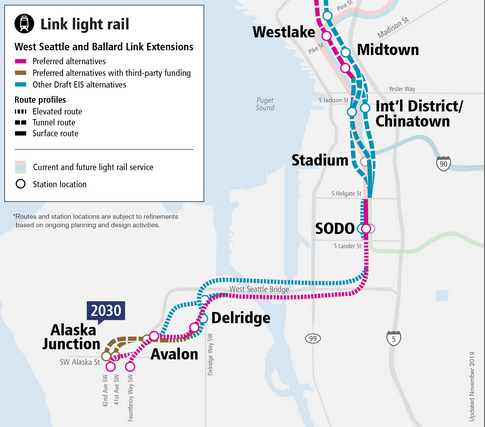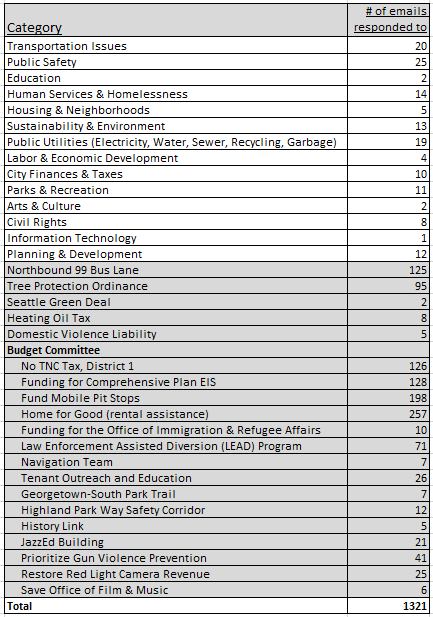This Week in the Budget; Public Safety Survey; Tunnel Tolls-Alaskan Way; Set Out Free Additional Yard Waste; Sound Transit Neighborhood Forums; Constituent Email
This Week in the Budget
On November 6th, Budget Committee Chair Bagshaw proposed an Initial Budget Proposal, which incorporated some of the Councilmember proposals presented between October 29 and November 1. The three overarching priorities Bagshaw announced are homelessness, housing and hygiene. The proposal includes funding for each, including $3.5 million in additional funding for the Law Enforcement Assisted Diversion (LEAD) program.
Councilmember proposals to modify this initial budget proposal were due on November 8th, and were presented in the Budget Committee on November 13th.
Next week, Chair Bagshaw will propose a Revised Budget on Monday, November 18th, which may include Council proposals presented on November 13th. The Budget Committee will vote on November 19th. The Full Council is scheduled to vote on the 2020 budget on November 25th.
Here’s a link to the Budget Committee schedule. Budget Committee meeting agendas and materials are available here. A description of the Council’s budget process is linked here.
Here are the proposals for which I was the prime sponsor that are included in the Initial Budget Proposal; some are in slightly different forms than originally proposed:
District 1 Specific Proposals:
- Establish a Capital Improvement Program (CIP) project in SDOT for West Marginal Way Safe Street and Accessibility Improvements at the Duwamish Longhouse and add new funding for planning and design
- Continue funding for a South Park Public Safety Coordinator
- Add funding for a natural capital valuation study
Citywide Proposals:
Public Safety and Public Health
- Add funds for a third Firefighter recruit class to address long-term staffing issues.
- Added funding to expand the Encampment Trash Program.
- Funds to develop and staff five Mobile Pit Stops to increase access to bathrooms and hygiene centers.
Homelessness and Housing
- Add funding for a diaper distribution pilot program for families in need to provide diapers for children in enhanced shelters, basic shelters, and tiny home villages.
- Add funding to the Department of Construction and Inspection for two new positions to support tenant and property owner outreach and education.
Civil Rights
- Direct existing funds to community-based organizations to respond to hate violence
- Request that the Office for Civil Rights spend a portion of its 2020 Proposed Budget on community-based organizations to create restorative justice approaches to individuals committing hate crimes
- Add two new positions at the Office for Civil Rights for a dispute resolution mediator and another to help with anti-discrimination and anti-harassment training.
Transportation and Utilities
- Request a report from HSD on subsidizing transit passes for employees of HSD contracted service providers
- Add funding to Seattle Public Utilities to improve shut-off notification to tenants in multifamily buildings.
- My proposal for a Proviso for spending on SDOT’s Center City Streetcar Connector CIP project to require development of an operations funding plan, and construction funding plan if federal funds are unavailable, was included in the Chair’s budget proposal in a different form, as a request due by September 1.
Economic Development and Arts/Culture
- Re-direct admissions tax to OED for a Film and Music Program Lead to help film industry
- Request that OED provide recommendations regarding the creation of a film commission
- Direct funding to support the Seattle Rep’s Public Works Seattle Program
Other proposals I submitted were not included in the initial budget proposal; I’ve re-submitted some of them in revised form, as well as some new proposals; these were presented November 13:
- Request that DON report on a strategy to develop a community-led place-based violence prevention initiative in Westwood and South Delridge
- Impose a proviso on funding for the Creative Industry Policy Advisor position in OED
- Request that OED report on the development of the Business Opportunity Support Program
- Proviso spending on the Delridge Way SW – RapidRide H Line CIP Project
- Request that SDOT and CBO report on the schedule and status of third party funding discussions regarding South Transit’s West Seattle and Ballard Link Extension project
- Adding funding to begin an RV pump-out pilot program that provides contracted mobile pump-out services to RVs located in environmentally sensitive areas.
- Requesting the Human Services Department to explore amending all contracts with agencies that do homelessness outreach to include needle collection.
- Requesting the Human Services Department assess and report on the opportunities associated with entering into “good neighbor” agreements, whereby Human Services contracted agencies take on responsibility for trash and waste removal within a certain distance of their facilities to maintain overall cleanliness.
- Funding for a full-time navigator to assist students through a Human Services Certificate Program that is designed to equip people with lived experiences of homelessness and poverty with the skills necessary to advance professionally in a social services field.
- Two different Statements of Legislative Intent that request the Police Department to report on scrap metal recycler compliance regarding copper wire theft, and another to report on city-wide asset loss and tracking.
- A Statement of Legislative Intent requesting that Seattle Public Utilities report to Council on the feasibility of installing a municipally owned internet (fiber optic cables) inside of the City-owned water pipes as a method to reduce costs of developing a network.
The adoption of I-976 by state voters presents significant challenges. For example, Seattle voters in 2014 approved funding for additional bus service through the Seattle Transportation Benefit District; motor vehicle fees provide around half of the funding. King County Metro estimates that passage of I-976 could result in cuts of 175,000 bus service hours during 2020; the benefit district currently funds 350,000 hours of bus service on 74 routes in Seattle, including over 1/3 of service on the C Line.
Seattle University Public Safety Survey Open Through 11/30
Seattle University is carrying out its 5th annual Seattle Public Safety Survey.
The purpose of the survey is to solicit feedback on public safety and security concerns from those who live and/or work in Seattle. A report on the survey results will be provided to the Seattle Police Department to assist them with making your neighborhood safer and more secure. The survey is accessible at publicsafetysurvey.org, and open through November 30th and is available in Amharic, Arabic, Chinese, English, Korean, Oromo, Somali, Spanish, Tagalog, Tigrinya and Vietnamese.
If you’d like additional information, please contact Taylor Lowery at lowerytaylor@seattleu.edu.
Survey results from 2015 through 2018 are available at SPD’s public safety survey webpage.
Tunnel Tolls/Alaskan Way
WSDOT began collecting tolls on the SR99 tunnel last weekend.
Tolls rates vary by time of day, and are less expensive with a Good to Go pass. Here’s information about how it works, and Good to Go passes.
Under state law, toll rates are set by the Washington State Transportation Commission (WSTC). The WSTC applied the following objectives in determining the options, as required by a state law that was passed by the state legislature in 2012:
- Minimize diversion, particularly during initial years of tolling as downtown Seattle construction limits capacity of alternate routes;
- Support facility performance and the customer experience;
- Provide sustainable toll rates that meet all legally required financial obligation
The funding plan adopted by the state legislature in 2009 included $400 million from tolls (later reduced to $200 million).
Opportunity to Set Out Free Additional Yard Waste
With the change in weather comes falling leaves. Unfortunately, these leaves clog storm drains which can lead to local flooding. Seattle Public Utilities is encouraging customers to rake their leaves to combat this and are offering free extra yard waste (up to 10 extra bags) throughout the month of November.
If you see a clogged storm drain, you can report it here.
Sound Transit Neighborhood Forums, 11/21, 12/7
Sound Transit is holding neighborhood forums about the alternatives they will be studying in the Draft Environmental Impact Statement. Two meetings will be in West Seattle.
The first, on November 21 from 6-8 p.m., will include all three West Seattle station areas: Alaskan Junction, Avalon, and Delridge. It takes place at the Alki Masonic Center at 4736 40th Avenue SW.
The second meeting, on December 7, will focus on the Delridge station, and builds upon the community engagement and collaboration approach outlined in the Racial Equity Toolkit. Spanish and Vietnamese interpreters will be available. The meeting is at the Delridge Community Center (Gym), 4501 Delridge Way SW, from 10 a.m. to noon.
More information about these meetings and other meetings along the alignment is available at the forum webpage, and the Sound Transit West Seattle and Ballard Link Extensions webpage.
October Constituent Email Report
Constituent correspondence is a very important task in my office. My staff and I spend time every day helping you improve our community, whether that’s by getting you help from a city department with our constituent case management services or giving you information about legislation that the Council is considering. The unshaded categories and numbers are problem-solving emails answered in October, what I refer to above as “case management services.” The shaded categories and numbers are emails answered in October related to policy or legislation that the Council is considering.
Posted: November 14th, 2019 under Councilmember Herbold, Homelessness, Human Services, Police Department, Public Health, Seattle Public Utliities, Transportation
Tags: 2019 City Budget, Capital Improvement Program, CIP, constituent e-mail report, Encampment Trash Program, Film and Music Program Lead, Initial Budget Proposal, Law Enforcement Assisted Diversion, LEAD, Link Lightrail, Mobile Pit Stops, OED, Office for Civil Rights, Racial Equity Toolkit, SDOT, Seattle Department of Transportation, Seattle Rep's Public Works Seattle Program, Sound Transit, South Park Public Safety Coordinator, Washington State Transportation Commission, West Seattle and Ballard Link Extensions, WSTC



